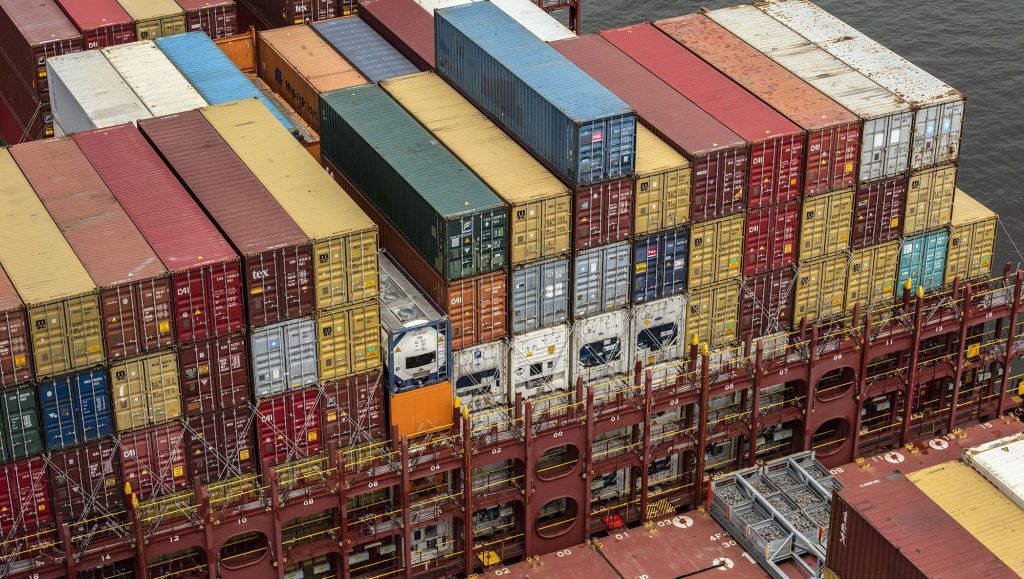São Paulo – Whereas Brazil-Middle East bulk cargo trade keeps flowing, the export of goods via container ships and aircraft has been severely impacted since the Covid-19 pandemic began. In an interview with ANBA, two executives with logistics conglomerate Unigroup explained how cargo gets shipped from Brazil to the Middle East and back, and what has changed with Covid-19.
The shipping of cargo in bulk is underpinned by large amounts of goods shipping both ways in the same kind of vessel: Brazil ships out food to the Middle East, which in turn supplies Brazil with fertilizer. “Bulk cargo shipping is doing great, coronavirus hasn’t impacted it at all,” says Pedro Oliveira, the project and business development manager with Unigroup arm Unimar.
The shipping is done direct port-to-port in vessels contracted on a per-journey basis. Oliveira relates that Brazilian seaports are operating as usual, save for some congestion since an all-time high sugar crop is beginning to ship out. “Most of it is headed for the Middle East,” he says, and port congestion is not pandemic-related at all.
The food crops that later ship in bulk from Brazil are grown using vast amounts of fertilizer, which also comes in in bulk. “We’re also having a great year for fertilizers. Brazil imports roughly 33 million tons of fertilizer,” says Oliveira. Arab countries are major suppliers.
Shipping containers
The pandemic has severely impacted container-based shipping to the Middle East. Even prior to it, the only Arab country to which product would ship direct in containers from Brazil was Morocco, in the Mediterranean. “There is no direct shipping service from Brazil to most countries. The goods that ship from Brazil to the Middle East get transshipped,” said Rafael Agustinelli, the national commercial manager for Unigroup companies Logitrade and Almex.

Middle East-bound container cargo from Brazil will usually stop at ports in the Middle East, Northern Europe or Asia, where it gets loaded onto another usually smaller vessel, alongside goods coming from other countries, before arriving at the final destination. “The demand isn’t that strong, which negates regular shipping, and so shipowners will end up optimizing their use of space,” says Agustinelli.
Unlike with bulk cargo, container-based shipping between Brazil and the Middle East is not on even terms. “Some countries import a lot and do not export much,” explains Agustinelli. Three container ships leave Brazil for the Middle East each week, including trips to the Mediterranean (Morocco) and trips with stopovers. “The problem is the journey back. They do not export all that much to us in containers,” the manager says.
Transshipping takes two to three days. Whereas stopovers add time to the delivery of Brazilian goods in Arab countries, on the other hand they ensure full containers on the way back. If the containers don’t get loaded in the Middle East before returning to Brazil, they will load up in Europe and Asia instead.
The executives note that transshipping in two to three days’ time isn’t much. “These days, transit from Santos (Brazil) to Northern Europe takes ten to twelve days, plus three days’ transshipping, plus one week (to the Middle East). In less than a month, the cargo has reached its destination,” says Agustinelli.
China
All of these connections mean that Brazil-Middle East container shipping is affected not only by domestic scenarios, but also by the pandemic’s effects on each of these hubs. “When Brazil went into quarantine, malls closed, retail closed, the dollar shot up. Brazil stopped selling. Most of the imports from Asia decreased dramatically,” Oliveira explains. This meant ships carrying less cargo (from Asia) in the journey back to Brazil.
Weak demand caused freight costs from China to Brazil drop from USD 1,500 to USD 400 per container, while ship numbers lowered by half. The Unimar and Logitrade executives relate that ships bound for Asia are focusing on servicing Asia itself, and container shipping to the Middle East has been redirected towards the Mediterranean.
“This ends up overloading other routes,” Agustinelli explains regarding the Mediterranean and Northern Europe. Brazil-Mediterranean routes are in high demand, and they can’t always go out immediately. Transshipment upon arriving in the Mediterranean is taking longer, because connections to other destinations are in shorter number. This means longer delivery times.
The biggest container shipping issues happened in May, but the situation is not back to normal yet, the executives interviewed by ANBA said. Oliveira claims the outlook is brighter going into the second half, although he doesn’t expect a strong rebound. A protracted transition back to normalcy is the likeliest scenario.
Air freight

The pandemic hit air freight the worst. According to Agustinelli, formerly daily frequencies from two Middle East airlines are only available three times a week. Stopover routes via Europe have also diminished. “The amount of cargo flown to the Middle East dropped by 50% to 60% from pre-pandemic times,” says Agustinelli.
Formerly set prices are now on a per-journey basis, and prices have gone up. “But this is not specific to the Middle East; it’s a worldwide thing,” Agustinelli remarks. The cargo gets flown in passenger planes, or in cargo planes if it’s heavier or bulkier. The goods that get flown are usually higher added value, or else it needs to get to the destination faster, the executives explained.
Oliveira claims that aside from the fact that less space is available for flying the product, priority is being given to personal protective and medical equipment, such as facemasks, hospital suppliers and respirators. “You don’t bring in a respirator on a ship. It will take 30 days to arrive. You bring it in in a plane,” he says.
According to the executives, air freight going back to normal is still uncertain. Like container shipping, it will depend on the developments regarding Covid-19, like a vaccine and consumer confidence. “We ship what people shop. If there’s no shopping going on, then there’s no shipping going on,” says Oliveira.
Unigroup
The Unigroup is a conglomerate of logistics businesses whose primary focus is freight forwarding, i.e. liaisoning between shipowners and customs authorities.
Unigroup has a staff of 150 in Brazil, with units in every Brazilian seaport except in the states of Alagoas and Ceará. Its businesses include shipping agency company Unimar; Uniocean, Multiseas and Uniline, which represent shipping container operators; maritime logistics company Logitrade; air freight logistics company Almex; and new projects company Casa Marítima.
Translated by Gabriel Pomerancblum




